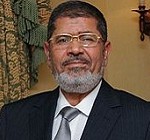On 22 December 2012, the president of Egypt, Mohamed Morsi, got approval through a referendum for a much-contested altered Constitution. Will this prove to be Pyrrhic victory, won at too high a cost? [1]
The confrontation between Morsi and his opponents started in June 2012, when he was elected President. The present phase of that confrontation started on November 22, when Morsi proclaimed that presidential decrees were above challenge in any court of law till a new Parliament was elected under the new Constitution. Opposition leader Mohammad El Baradei immediately accused Morsi of “wanting to be a new pharaoh.”
Two days later, the National Salvation Front (NSF) was formed. It includes leftists, secularists and liberals. The parties that united against the president include the Egyptian Popular Current, al-Dastour, al-Tajammu, Free Egyptians, New Wafd, the Democratic Front, the Egyptian Social Democratic Party, and the Conference Party.
The three prominent leaders of the NSF are El Baradei, winner of the Nobel Peace Prize and former head of the UN’s International Atomic Energy Agency, Amr Moussa, the former secretary general of the Arab League (and Ambassador to India in the late 1980s), and Hamdeen Sabahi, a Nasserist politician who stood third in the presidential election.
El Baradei is however not fully justified in accusing Morsi of trying to become a “new pharaoh.” The Supreme Court of Egypt was reportedly about to dissolve the Constituent Assembly. It was necessary for Morsi to pre-empt any such move and his proclamation specifically said that the judiciary could not dissolve the assembly.
On November 24, Morsi staged a partial retreat: Only “acts of sovereignty” were above judicial scrutiny, he said. The NSF was not appeased and reinforced its agitation. Some members of the Constituent Assembly, Coptic Christians and liberals, boycotted assembly sessions. Fearing that a court ruling would dissolve the assembly, members of the assembly held night sessions, and by November 30 the new Constitution was ready to be put to a referendum. Morsi announced the dates: December 15 and 22. The NSF threatened to boycott the referendum, but later changed its mind. Morsi won the referendum by a two-thirds majority, but only one-third of the electorate voted.
After Morsi announced the dates for the referendum, the situation deteriorated. His party’s offices were attacked and burned. The presidential palace came under siege. Morsi was compelled to call the army to protect him. This dependence on the armed forces is not a good sign for a democratising Egypt. Morsi had earlier staged a coup by dismissing Field Marshal Mohamed Tantawi, the head of the Supreme Command of the Armed Forces (SCAF), which had stood in the way of Egypt’s march towards democracy when President Hosni Mubarak left office. The SCAF tried to curtail the president’s powers even after he took office in June 2012. Morsi must have reluctantly sought protection from the army.
Is the new Constitution bad for Egypt? Not really. Its highlights include: The Sharia remains the main source of legislation; Al-Azhar, Sunni Islam’s leading authority, will be consulted on matters related to the Sharia; Christianity and Judaism will be the main source of legislation for Christians and Jews; their right to beliefs will be protected; the state’s obligations are limited to Islam, Christianity and Judaism; and a president can stay in office only for two four-year terms.
The 1971 Constitution also had the same language about Sharia. It permitted the president to be re-elected any number of times. The position given to Al-Azhar is new.
President Morsi has said that he is willing to enter into a dialogue on amendments to the Constitution, but the NSF has yet to accept the offer. Elections to the parliament will be held in early 2013. NSF leaders have said that they are hopeful of a majority, in which event El Baradei will want to “cancel” the new Constitution. It remains to be seen if the NSF will stay united and fight the election.
Meanwhile, Egypt’s economy is going from bad to worse. Since the commencement of the agitation against Mubarak in January 2011, the tourism industry has been losing $267 million a week; the Central Bank has spent $20 billion to prop the falling Egyptian pound, now at its lowest in eight years. Rich Egyptians are sending money out. Foreign exchange reserves are perilously low at $15 billion, enough for imports only for three months.
The International Monetary Front wants Egypt to restructure its economy, including cutting energy subsidy, before it loans $4.8 billion. Qatar and the African Development Bank might help the economically beleaguered country.
Morsi has been blamed for polarising Egypt. The charge is not entirely justified. The NSF too is responsible for the polarisation. Egypt may still be headed towards democracy, slowly and surely, but the liberals and secularists bear a huge responsibility in making that journey possible.
Ambassador K. P. Fabian served in the Indian Foreign Service between 1964 and 2000, and is currently the President of AFPRO (Action For Food Production). He also holds the K. P. S. Menon Chair at the School of International Studies in Mahatma Gandhi University, Kerala. He is currently writing a book on the Arab Spring.
This article was exclusively written for Gateway House: Indian Council on Global Relations. You can read more exclusive content here.
For interview requests with the author, or for permission to republish, please contact outreach@gatewayhouse.in.
© Copyright 2013 Gateway House: Indian Council on Global Relations. All rights reserved. Any unauthorized copying or reproduction is strictly prohibited.
[1] In B.C. 279, King Pyrrhus of Epirus fought a war with Rome and won at too high a cost. When told of his victory, the king, according to historian Plutarch, responded that another such victory “would utterly undo him.”


